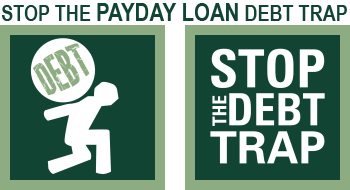WASHINGTON, D.C. – Today, 88 organizations from The Stop the Debt Trap campaign, a coalition of state and national consumer, civil rights, faith, seniors’, labor, and other groups, submitted a comment to the Federal Deposit Insurance Corp. (FDIC) urging the agency’s leadership not to support unaffordable bank loans above a 36% annual percentage rate (APR), to require underwriting that considers borrower’s income and expenses to determine their ability to repay high-cost loans, and to stop banks from renting out their charters to help payday lenders evade state interest rate laws.
The comment is in response to FDIC’s public request for information (RFI) on how to oversee small dollar loans made by state-charted banks it supervises.
The coalition wrote: Several safeguards are critical to ensure that bank loan programs—particularly those designed for financially distressed consumers—promote financial inclusion rather than exacerbate financial exclusion and distress. To that end, we urge the FDIC to (1) prevent bank partnerships that evade state interest rate limits; (2) require lenders to consider consumers’ ability to repay (taking into account both income and expenses) and advise that small dollar installment loans to be priced at 36% or less; and (3) retain the FDIC’s critical 2013 guidance addressing payday loans (“deposit advances”) made by banks. … [Additionally] given the tremendous burden overdraft fees impose on banks’ most distressed customers, we urge the Agency to enforce its guidance addressing abusive overdraft fees; discourage charging these fees on debit card and ATM transactions; and strongly encourage safe accounts without these fees.”
National and state organizations signing the comment letter include: National Consumer Law Center (on behalf of its low-income clients), the Center for Responsible Lending, NAACP, the Leadership Conference on Civil and Human Rights, California Reinvestment Coalition, Center for Economic Integrity, and North Carolina Justice Center. A full list of the 88 organizations is available here.
Additional Background
This RFI has been considered a potential first step toward the agency’s rescinding 2013 guidance advising an ability-to-repay determination on high-cost bank payday “deposit advance” loans. Advocates have urged strongly that the FDIC retain keep that guidance in place The data on bank payday loans are clear: They were a long-term debt trap. They were harmful to consumers, as well as to banks’ reputations and safety and soundness. Deposit advance borrowers were seven times more likely to have their accounts charged off than their counterparts who did not take deposit advance loans. Moreover, these loans did not “protect” bank customers from overdraft fees: former borrowers, compared to non-borrowers, did not incur an increase in overdraft or NSF fees when deposit advance was discontinued. In fact, FDIC banks were not among the handful making payday loans.
In October of 2017 after the OCC rescinded its guidance on bank payday loans, groups wrote to banks urging them to stay away from this usury. The CFPB has also indicated that it is considering revising its payday rule. And banks threaten to engage in high-cost installment lending more broadly. These moves are a dangerous change in policy that goes against public rejection of high-cost payday loans and a return to unfair, discriminatory lending practices that cause particular harm to low-income borrowers and borrowers of color.
